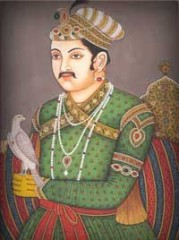07/26/2012
Fatehpur Sikri
Last June, while monsoon was glooming, I went for my first outing since I have moved to Delhi. Fatehpur Sikri.
I was most interested in visiting this ghost town I had heard about!!
I have to say I was a bit disappointed as it is more of a palace, the kind you see a lot in Rajasthan, than a ghost town.
However I really liked the place, it was very big and hardly anyone was visiting it.
It is called a ghost city because it was inhabited for only 13 years (from 1572 to 1585) before being abandoned as water had dried out. I always thought one must be stupid to build a city on a dry place but water had actually been abundant there since pre-historic time…
Talking of water, I loved the master bedroom with the summer bed, on a platform 2 meters high; in summer time, they would fill the floor with water and rose water so that it would cool down and smell good!
Fatehpur Sikri was the “first planned city of the Mughals” and the residence of the Mughal Emperor Akbar (son of Humayun, grandson of Babur the first Mughal Emperor). He had “shifted his residence and court from Agra to Sikri to honour the Sufi Saint Sheikh Salim Chishti, who resided here (in a cavern on the ridge).”
So there are two parts to visit: the palace and the religious courtyard with the tomb of the saint which is super famous. It is said that if you go there, place a piece of cloth on the tomb, throw rose petals, make three wishes and tie a thread on the window, your wishes will come true. Legend has it that this is how Carla Bruni got her baby!!
Akbar was a great Emperor, illiterate but cultivated and ultra-tolerant. 
As his Muslim ancestors before him, he had to fight the Rajputs (Hindus), who were dangerous but not unified. “Make love not war”: Akbar married the daughter of a Rajput King (from Amber) – she was offered to him as her father was seeking protection of Akbar against his peers who wanted to take his throne. “Akbar followed the same feudal policy toward the other Rajput chiefs. They were allowed to hold their ancestral territories, provided that they acknowledged Akbar as emperor, paid tribute, supplied troops when required, and concluded a marriage alliance with him.” “In total, Akbar had 36 wives of various ethnic and religious backgrounds.”
“Probably even more importantly to his ordinary subjects, Akbar repealed a special tax placed on Hindu pilgrims who visited sacred sites, and completely repealed the jizya, or yearly tax on non-Muslims. What he lost in revenue by these acts, he more than regained in good-will from the Hindu majority of his subjects.”
 |
| Fatehpur Sikri, UP - June 2012 |
Sources:
http://asi.nic.in/asi_monu_whs_fatehpursikri.asp
http://www.britannica.com/EBchecked/topic/11421/Akbar
http://asianhistory.about.com/od/india/p/akbarthegreatbio.htm
08:00 Posted in Travelling (in India!) | Permalink | Comments (0) | Tags: india, fatehpur sikri, akbar, muslims, hindus, religion, ghost town, saint sufi sheikh salim chishti | ![]() Facebook | |
Facebook | |














